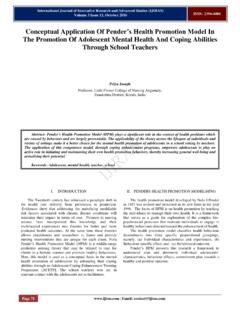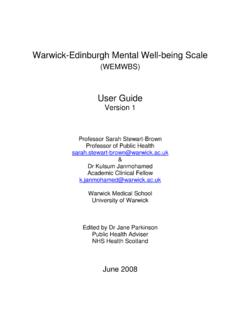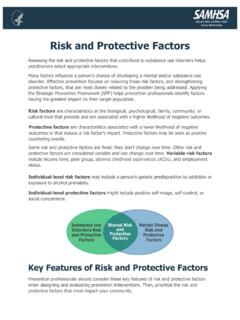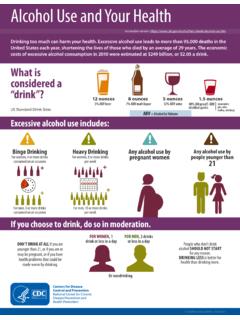Transcription of WHO | Mental health - WHO | World Health Organization
1 Mental HEALTHPROMOTIONP artners inLife SkillsEducationConclusions from aUnited NationsInter-Agency MeetingDepartment of Mental HealthWorld Health OrganizationGenevaWHO/MNH/ : EnglishDistribution : Limited * * *Life skills education is designed to facilitate the practice andreinforcement of psychosocial skills in a culturally anddevelopmentally appropriate way; it contributes to the promotion ofpersonal and social development, the prevention of Health and socialproblems, and the protection of human rights. * * *This document is the product of a United Nations Inter-Agency Meetingheld at WHO headquarters in Geneva on 6-7 April 1998.
2 The aim ofthe meeting was to generate consensus among United Nations agenciesas to the broad definition and objectives of life skills education andstrategies for its implementation, in order to facilitate collaborationbetween the various organizations working to support the advancementof life skills IN LIFE SKILLS EDUCATION -CONCLUSIONS FROM A UNITED NATIONS INTER-AGENCY MEETINGDEPARTMENT OF Mental HEALTHSOCIAL CHANGE AND Mental Health CLUSTERWORLD Health ..1 Organization ..1 Background ..1 Objectives .. AND concerns ..2 Defining life skills ..3 Why teach life skills? ..4 State of the art in life skills education in schools.
3 5 Life skills outside school .. FOR COLLABORATION ..8 Annex of participants ..9 Annex from United Nations conventions and examples ofrecommendations related to life skills education ..11 Annex skills projects in organizations of the United Nations system: summarynotes ..131 PARTNERS IN LIFE SKILLS EDUCATION -CONCLUSIONS FROM A UNITED NATIONS INTER-AGENCY Inter-Agency Meeting on Life Skills Education was held at WHO headquarters,Geneva, Switzerland on 6 and 7 April his opening address, Dr Li Shichuo, Assistant Director-General, WHO noted that theMental Health promotion unit in WHO s Mental Health Programme had been activelyworking to support the advancement of life skills education in schools.
4 Over the years, thathas brought the WHO Mental Health Programme into contact with several other UnitedNations agencies interested in the subject. In particular, close collaboration had beenestablished between WHO and UNICEF in that domain and information had graduallyreached WHO about the activities of other United Nations agencies. Accordingly, themeeting had been arranged to enable the various organizations to learn more about eachother s work, interests and objectives related to life skills education. It offered anopportunity to learn about the activities of each agency in the domain, and a chance toidentify common goals and objectives.
5 That in turn would help to identify ways in whichthey could work together effectively to advance those common to develop and implement life skills education in schools have beenundertaken in many countries around the World . The need for life skills education ishighlighted, directly and indirectly in the Convention of the Rights of the Child and a number ofinternational recommendations (see Annex 2). Life skills education is aimed at facilitating thedevelopment of psychosocial skills that are required to deal with the demands and challengesof everyday life. It includes the application of life skills in the context of specific risksituations and in situations where children and adolescents need to be empowered to promoteand protect their rights.
6 Following the study of many different life skills programmes, theWHO Department of Mental Health identified five basic areas of life skills that are relevantacross cultures:!decision-making and problem-solving;!creative thinking and critical thinking;!communication and interpersonal skills;!self-awareness and empathy;!coping with emotions and coping with stress. are many different reasons why these life skills are taught. In Zimbabwe and Thailand the impetus for initiating life skills education was the prevention of HIV/AIDS. InMexico, it was the prevention of adolescent pregnancy. In the United Kingdom, an importantlife skills initiative was set up to contribute to child abuse prevention , and in the USA there arenumerous life skills programmes for the prevention of substance abuse and violence.
7 In South2 Africa and Colombia an important stimulus for life skills education has been the desire tocreate a curriculum for education for life, called Life Orientation education in South Africaand Integral Education in Colombia. There are many initiatives of this nature in which, inaddition to primary prevention objectives, life skills education has been developed to promotethe positive socialization of children. countries are now considering the development of life skills education inresponse to the need to reform traditional education systems, which appear to be out of stepwith the realities of modern social and economic life.
8 Problems such as violence in schoolsand student drop-out are crippling the ability of school systems to achieve their academicgoals. Furthermore, in addition to its wide-ranging applications in primary prevention and theadvantages that it can bring for education systems, life skills education lays the foundation forlearning skills that are in great demand in today s job markets. purpose of the Inter-Agency Meeting was to bring together the staff of UnitedNations agencies that are working to support the advancement of life skills education (seeAnnex 3). It was planned as an opportunity for different organizations to clarify and agreeupon a common conceptual basis for support from the United Nations system to facilitate thedevelopment of life skills education in schools.
9 Meeting was designed to:!generate consensus as to the broad definition and objectives of life skills education andstrategies for its implementation;!improve collaboration between the various agencies working to support life skillseducation in AND discussions led to agreement among participants on a wide range of key issues. The Meeting s conclusions are summarized below under five main headings relating to:concerns shared by the organizations represented; the definition of life skills ; the reasons forteaching life skills; life skills education in schools today; and life skills outside schools. Shared concerns identified by participants in relation to life skills education includedthe need to:!
10 Strengthen and improve school Health ;!promote the development of long-term and holistic life skills curricula in schools;!promote democracy, gender equality and peace;!prevent Health and social problems including psychoactive substance use, HIV/AIDS,adolescent pregnancy and with conflict that cannot be resolved, dealing withauthority, solving problems, making and keepingfriends/relationships, cooperation, self-awareness, creativethinking, decision-making, critical thinking,dealing with stress,negotiation, clarification of values, resisting pressure, coping withdisappointment, planning ahead, empathy, dealing with emotions,assertiveness, active listening, respect, tolerance, trust, sharing,sympathy.














